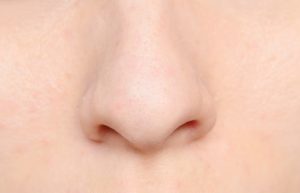
Small polyps can be symptomless but larger ones may block nasal passages, which can result in breathing problems, lost sense of smell and frequent infections.
Nasal polyps are most common in adults and medication is typically used to shrink them. In some cases surgery may be required to remove them, but even when removed nasal polyps can return.
Nasal polyp causes
The exact cause of nasal polyps is currently still unclear, and it’s also unclear why some people experience chronic inflammation or why it triggers nasal polyps. Some ideas surrounding the development of nasal polyps reveal that it may have something to do with a person’s immune response, which is different from others.
Although there is not an exact cause for nasal polyps, there are certain conditions that increase a person’s risk of developing them. Risk factors for nasal polyps include:
- Aspirin sensitivity
- Asthma
- Allergic fungal sinusitis
- Rhinitis
- Cystic fibrosis
- Churg-Strauss syndrome – inflammation of blood vessels
- Age
- Genetics
Nasal polyp symptoms
As mentioned, when nasal polyps are small they can be symptomless, but symptoms associates with nasal polyps include:
- Stuffiness
- Postnasal drip
- Decrease or loss of smell
- Diminished sense of taste
- Facial pain or headache
- Pain in upper teeth
- Pressure on forehead or face
- Snoring
- Itching around eyes
Emergency care should be taken if the following symptoms appear:
- Serious trouble breathing
- Sudden worsening of symptoms
- Double vision, reduced vision, or inability to move eyes
- Severe swelling around eyes
- Severe headache with high fever
Nasal polyp treatment and prevention
Treatment of nasal polyps involves reducing their size and eliminating them. That can be done using the following techniques.
- Medication – nasal, injectable or oral corticosteroids, antihistamines, aspirin
- Surgery – endoscopic surgery can help remove polyps
Prevention of nasal polyps involves the following tips:
- Manage allergies and asthma as they are risk factors for nasal polyps.
- Avoid nasal irritants.
- Practice good hygiene.
- Humidify your room.
- Use nasal rinse or nasal lavage – this can be purchased or your can make your own solution with distilled, sterile water.
Related Reading:
Asthma sufferers may have worsened migraines
Researchers have found that pre-existing asthma may be a strong predictor for future chronic migraines in those who currently experience occasional migraine headaches. Lead author, Vincent Martin, M.D., said, “If you have asthma along with episodic or occasional migraine, then your headaches are more likely to evolve into a more disabling form known as chronic migraine.” Continue reading…
Sinus infection related to asthma
Sinus infection (sinusitis) is related to asthma. The sinuses are located in the cheekbones, around the eyes and behind the nose in hollow cavities. The sinuses help keep the air that is inhaled warm, moist and filtered by being lined with mucus. If something blocks the mucus from draining normally, an infection can occur. Continue reading…
Sources:
http://www.mayoclinic.org/diseases-conditions/nasal-polyps/basics/prevention
http://www.medicalnewstoday.com/articles